On September 4-5, the Council will host seventeen speakers at its Future Leaders Summit to discuss global security issues alongside the 2014 Wales NATO Summit conference. Read their bios below.
Speakers
H.E. Irakli Alasania | Gen. Philip M. Breedlove | H.E. E. Børge Brende | The Rt. Hon. Nick Clegg | H.E. Kolinda Grabar-Kitarović | H.E. Carl Haglund | H.E. Miroslav Lajčák | Dr. Karl A. Lamers | Gen. Jean-Paul Paloméros | H.E. Milica Pejanović Đurišić | Barry Pavel | Fabrice Pothier | Anders Fogh Rasmussen | H.E. Taavi Rõivas | Ms. Marie Skaare | The Hon. Alexander Vershbow | Mr. Damon Wilson
H.E. Irakli Alasania
Minister of Defense, Ministry of Defense of Georgia
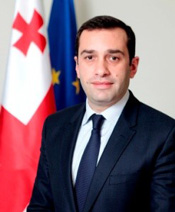 Irakli Alasania previously served as Georgia’s permanent representative to the United Nations from June 2006 to December 2008. Before becoming Georgia’s UN envoy, Alasania had served as the adviser to the Georgian president on the Abkhaz conflict. He also worked as the president’s special representative to Georgian-Abkhaz talks. Alasania was appointed as the president’s special representative for Abkhazia. At that time, performed the duties of the head of the government of Abkhazia from exile. In 2004 Mr. Alasania was named deputy secretary of the National Security Council. Prior to that, he served as first deputy minister of defense. Before joining the ministry, Alasania was first deputy minister of state security. From October 2001– January 2002, Alasania worked at the National Security Council as the head of the directorate for security issues. From 1998 through September 2001, he was at the Ministry of Foreign Affair’s CIS and Russian affairs directorate. He also worked at the Georgian embassies to the United States, Canada and Mexico. Alasania received a degree in international law from Tbilisi State University in 1995.
Irakli Alasania previously served as Georgia’s permanent representative to the United Nations from June 2006 to December 2008. Before becoming Georgia’s UN envoy, Alasania had served as the adviser to the Georgian president on the Abkhaz conflict. He also worked as the president’s special representative to Georgian-Abkhaz talks. Alasania was appointed as the president’s special representative for Abkhazia. At that time, performed the duties of the head of the government of Abkhazia from exile. In 2004 Mr. Alasania was named deputy secretary of the National Security Council. Prior to that, he served as first deputy minister of defense. Before joining the ministry, Alasania was first deputy minister of state security. From October 2001– January 2002, Alasania worked at the National Security Council as the head of the directorate for security issues. From 1998 through September 2001, he was at the Ministry of Foreign Affair’s CIS and Russian affairs directorate. He also worked at the Georgian embassies to the United States, Canada and Mexico. Alasania received a degree in international law from Tbilisi State University in 1995.
Gen. Philip M. Breedlove
Supreme Allied Commander, NATO; Commander, US European Command
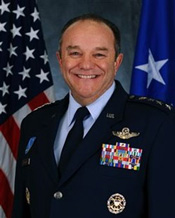 General Philip M. Breedlove assumed duties as Supreme Allied Commander, Europe and Commander of US European Command in May 2013. General Breedlove is a command pilot with over 3,500 flying hours primarily in the F-16. He has flown combat missions in Operation Joint Forge supporting the peacekeeping operation in Bosnia and Operation Joint Guardian to implement the peace settlement in Kosovo and commanded multiple fighter wings in the United States, South Korea, and Italy. From 2008-2009, General Breedlove commanded the 3rd Air Force in Ramstein, Germany. From 2012-2013, he was commander of US Air Forces in Europe, US Air Forces Africa, Headquarters Allied Air Command in Ramstein, and director of the Joint Air Power Competence Centre in Kalkar, Germany. In addition to General Breedlove’s command assignments, he has served as the senior military assistant to the Secretary of the Air Force; the Vice Director for Strategic Plans and Policy on the Joint Staff; the deputy chief of staff for operations, plans and requirements for US Air Force headquarters; and vice chief of staff of the US Air Force. General Breedlove earned a Master of Science degree in Aeronautical Technology from Arizona State University and a Master’s degree in National Security Studies from the National War College in 1995. General Breedlove holds various decorations and awards, including the Distinguished Service Medal, the Defense Superior Service Medal, and four awards of the Legion of Merit.
General Philip M. Breedlove assumed duties as Supreme Allied Commander, Europe and Commander of US European Command in May 2013. General Breedlove is a command pilot with over 3,500 flying hours primarily in the F-16. He has flown combat missions in Operation Joint Forge supporting the peacekeeping operation in Bosnia and Operation Joint Guardian to implement the peace settlement in Kosovo and commanded multiple fighter wings in the United States, South Korea, and Italy. From 2008-2009, General Breedlove commanded the 3rd Air Force in Ramstein, Germany. From 2012-2013, he was commander of US Air Forces in Europe, US Air Forces Africa, Headquarters Allied Air Command in Ramstein, and director of the Joint Air Power Competence Centre in Kalkar, Germany. In addition to General Breedlove’s command assignments, he has served as the senior military assistant to the Secretary of the Air Force; the Vice Director for Strategic Plans and Policy on the Joint Staff; the deputy chief of staff for operations, plans and requirements for US Air Force headquarters; and vice chief of staff of the US Air Force. General Breedlove earned a Master of Science degree in Aeronautical Technology from Arizona State University and a Master’s degree in National Security Studies from the National War College in 1995. General Breedlove holds various decorations and awards, including the Distinguished Service Medal, the Defense Superior Service Medal, and four awards of the Legion of Merit.
H.E. E. Børge Brende
Minister of Foreign Affairs, Kingdom of Norway
 Børge Brende has been the Minister of Foreign Affairs since October, 2013. Prior to this, he had a distinguished career in business, politics, and public service, which included his tenure as member of the board of Statoil from 2012 to 2013, chair of the board of Mesta AS from 2010 to 2013, secretary general of the Norwegian Red Cross from 2009 to 2011, and international vice chairman of the China Council for the International Cooperation on Environment and Development (advisory board to the State Council) from 2005 to 2013, adding to his record of committee work on issues ranging from sustainable development to promoting democracy. Between 2008 and 2009, Brende was the managing director of the World Economic Forum. He held the government posts of Cabinet minister of the Environment from 2001 to 2004 and Cabinet minister of Trade and Industry from 2004 to 2005. Prior to this post, Brende was the chairman of the UN Commission on Sustainable Development from 2003 to 2004. He also served as a member of the Norwegian parliament for over a decade. His political career began with his participation in the Norwegian Young Conservatives, becoming Political Secretary to the chairman in 1985. From 1986 to 1987, he was political adviser to the Conservative Party chairman and parliamentary group. In 1988, he was elected as chairman of the Norwegian Young Conservatives. In 1992 he became a full time member of the City of Trondheim’s Municipal executive board and chairman of the Conservative party group in the Trondheim City Council. In 1994, he was elected deputy Chairman of the Norwegian Conservative party and was member of the Storting, the Norwegian parliament, from 1997 to 2007. He served as member of the Standing Committee on Finance and Economic Affairs and deputy chairman of the Standing Committee on Energy and the Environment. Brende received his BA from the Norwegian University of Science and Technology.
Børge Brende has been the Minister of Foreign Affairs since October, 2013. Prior to this, he had a distinguished career in business, politics, and public service, which included his tenure as member of the board of Statoil from 2012 to 2013, chair of the board of Mesta AS from 2010 to 2013, secretary general of the Norwegian Red Cross from 2009 to 2011, and international vice chairman of the China Council for the International Cooperation on Environment and Development (advisory board to the State Council) from 2005 to 2013, adding to his record of committee work on issues ranging from sustainable development to promoting democracy. Between 2008 and 2009, Brende was the managing director of the World Economic Forum. He held the government posts of Cabinet minister of the Environment from 2001 to 2004 and Cabinet minister of Trade and Industry from 2004 to 2005. Prior to this post, Brende was the chairman of the UN Commission on Sustainable Development from 2003 to 2004. He also served as a member of the Norwegian parliament for over a decade. His political career began with his participation in the Norwegian Young Conservatives, becoming Political Secretary to the chairman in 1985. From 1986 to 1987, he was political adviser to the Conservative Party chairman and parliamentary group. In 1988, he was elected as chairman of the Norwegian Young Conservatives. In 1992 he became a full time member of the City of Trondheim’s Municipal executive board and chairman of the Conservative party group in the Trondheim City Council. In 1994, he was elected deputy Chairman of the Norwegian Conservative party and was member of the Storting, the Norwegian parliament, from 1997 to 2007. He served as member of the Standing Committee on Finance and Economic Affairs and deputy chairman of the Standing Committee on Energy and the Environment. Brende received his BA from the Norwegian University of Science and Technology.
The Rt. Hon. Nick Clegg
Deputy Prime Minister, Lord President of the Privy Council, Member of Parliament for Sheffield Hallam, United Kingdom
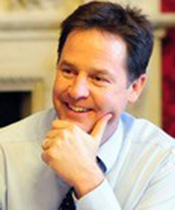 Nick Clegg became Deputy Prime Minister and Lord President of the Privy Council in May 2010. He is the MP for Sheffield Hallam. As deputy prime minister, Clegg is responsible for overseeing the government’s drive to rebalance the economy, leading the government’s political and constitutional reform agenda, chairing the Home Affairs Committee, co-chairing the Coalition Committee, deputy-chairing the National Security Council, and building strategic relationships in Europe and across the world. Clegg was elected MEP for the East Midlands in 1999, and was Trade and Industry spokesman for the European Liberal Democrat and Reform group until he stood down in 2004. He was elected as MP for Sheffield Hallam in 2005, and served as Liberal Democrat Spokesperson on Europe and Shadow Home Secretary before becoming Leader of the Liberal Democrats in 2007. Before being elected, Clegg worked in journalism, consultancy and university lecturing. He also worked for 5 years at the European Commission, where his role included managing aid projects in Central Asia and trade negotiations with China and Russia. Clegg holds an undergraduate degree from the University of Cambridge and postgraduate qualifications from the University of Minnesota and the College of Europe in Bruges.
Nick Clegg became Deputy Prime Minister and Lord President of the Privy Council in May 2010. He is the MP for Sheffield Hallam. As deputy prime minister, Clegg is responsible for overseeing the government’s drive to rebalance the economy, leading the government’s political and constitutional reform agenda, chairing the Home Affairs Committee, co-chairing the Coalition Committee, deputy-chairing the National Security Council, and building strategic relationships in Europe and across the world. Clegg was elected MEP for the East Midlands in 1999, and was Trade and Industry spokesman for the European Liberal Democrat and Reform group until he stood down in 2004. He was elected as MP for Sheffield Hallam in 2005, and served as Liberal Democrat Spokesperson on Europe and Shadow Home Secretary before becoming Leader of the Liberal Democrats in 2007. Before being elected, Clegg worked in journalism, consultancy and university lecturing. He also worked for 5 years at the European Commission, where his role included managing aid projects in Central Asia and trade negotiations with China and Russia. Clegg holds an undergraduate degree from the University of Cambridge and postgraduate qualifications from the University of Minnesota and the College of Europe in Bruges.
H.E. Kolinda Grabar-Kitarović
NATO Assistant Secretary General for Public Diplomacy, NATO
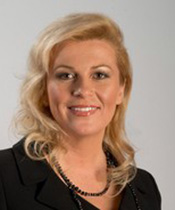 Kolinda Grabar-Kitarović took up her position as NATO’s assistant secretary general for public diplomacy in July of 2011. She previously served as Croatia’s minister of foreign affairs and European integration and, more recently, as ambassador of Croatia to the United States (2008-2011). She began her career in 1992 as an adviser to the International Cooperation Department of Croatia’s Ministry of Science and Technology, moving on to become an adviser in the foreign ministry. In 1995, Grabar-Kitarović became director of the foreign ministry’s North American department, and from 1997 to 2000, she worked as a diplomatic counsellor and deputy chief of mission at the Embassy of Croatia in Canada. She then returned to the foreign ministry as minister-counsellor. In November 2003, Grabar-Kitarović was elected to the Croatian Parliament and in December 2003, she became the minister of European Integration. She was sworn in as Croatia’s foreign minister in February 2005, her central task being to guide the country into the European Union and NATO. Grabar-Kitarović holds a Master’s degree in international relations from the Faculty of Political Science, University of Zagreb.
Kolinda Grabar-Kitarović took up her position as NATO’s assistant secretary general for public diplomacy in July of 2011. She previously served as Croatia’s minister of foreign affairs and European integration and, more recently, as ambassador of Croatia to the United States (2008-2011). She began her career in 1992 as an adviser to the International Cooperation Department of Croatia’s Ministry of Science and Technology, moving on to become an adviser in the foreign ministry. In 1995, Grabar-Kitarović became director of the foreign ministry’s North American department, and from 1997 to 2000, she worked as a diplomatic counsellor and deputy chief of mission at the Embassy of Croatia in Canada. She then returned to the foreign ministry as minister-counsellor. In November 2003, Grabar-Kitarović was elected to the Croatian Parliament and in December 2003, she became the minister of European Integration. She was sworn in as Croatia’s foreign minister in February 2005, her central task being to guide the country into the European Union and NATO. Grabar-Kitarović holds a Master’s degree in international relations from the Faculty of Political Science, University of Zagreb.
H.E. Carl Haglund
Minister of Defense, Republic of Finland
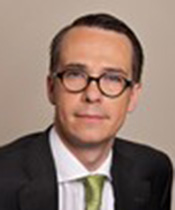 Carl Haglund has served as the Minister of Defense of the Republic of Finland since July 2012. He is also the party leader of the Swedish People’s Party in Finland’s parliament. From 2009 until 2012, Mr. Haglund served as a member of the European Parliament, elected as the candidate with the highest number of votes in his party. He gave up his seat at the European Parliament in summer 2012 after being elected as the party leader of the Swedish People’s Party and appointed to the position of Minister of Defense. Mr. Haglund began his political career in 2002 as the secretary for the Svensk Ungdom youth organization of the Swedish People’s Party. He became a special assistant for the ministerial group of the Swedish People’s Party in 2007, and a year later the state secretary for the Minister of Culture and Sport. Preceding his political career, Mr. Haglund worked as the editor-in-chief and managing director of the Papper newspaper, the editor-in-chief of the Studentbladet student newspaper, and a program host for Radio Vega. Since 2001, he has served as a member of the Swedish Assembly of Finland (Folktinget), acting as the chair of the Assembly’s Swedish People’s Party Group since 2007. Mr. Haglund holds a master’s degree in economic sciences from Hanken School of Economics in Helsinki, Finland.
Carl Haglund has served as the Minister of Defense of the Republic of Finland since July 2012. He is also the party leader of the Swedish People’s Party in Finland’s parliament. From 2009 until 2012, Mr. Haglund served as a member of the European Parliament, elected as the candidate with the highest number of votes in his party. He gave up his seat at the European Parliament in summer 2012 after being elected as the party leader of the Swedish People’s Party and appointed to the position of Minister of Defense. Mr. Haglund began his political career in 2002 as the secretary for the Svensk Ungdom youth organization of the Swedish People’s Party. He became a special assistant for the ministerial group of the Swedish People’s Party in 2007, and a year later the state secretary for the Minister of Culture and Sport. Preceding his political career, Mr. Haglund worked as the editor-in-chief and managing director of the Papper newspaper, the editor-in-chief of the Studentbladet student newspaper, and a program host for Radio Vega. Since 2001, he has served as a member of the Swedish Assembly of Finland (Folktinget), acting as the chair of the Assembly’s Swedish People’s Party Group since 2007. Mr. Haglund holds a master’s degree in economic sciences from Hanken School of Economics in Helsinki, Finland.
H.E. Miroslav Lajčák
Deputy Prime Minister and Minister of Foreign and European Affairs, the Slovak Republic
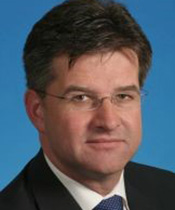 Miroslav Lajčák has held numerous significant positions at the Ministry of Foreign Affairs as well as other governmental institutions during his career. Lajčák studied law at the Comenius University and continued his studies at the State Institute of International Relations in Moscow. He launched his career at the Federal Ministry of Foreign Affairs of Czechoslovakia in Prague. In 1993, he became director of the Cabinet of the Minister of Foreign Affairs, later Director of the Cabinet of the Prime Minister of the Slovak Republic. In 1994, he was appointed ambassador of the Slovak Republic to Japan, and later he served as the Ambassador to the Federal Republic of Yugoslavia (later Serbia and Montenegro), the Republic of Albania, and the Republic of Macedonia. From 2005 to 2006 he was chosen to be the personal representative of the EU High Representative for CFSP Javier Solana to facilitate the Montenegrin dialogue. Since 2007, Lajčák worked as High Representative of International Community and EU Special Representative for Bosnia and Herzogovina and in January 2009, he was appointed minister of foreign affairs of the Slovak Republic. He held this position until June 2010. By the end of 2010, he was assigned Managing Director Russia, Eastern Neighborhood and the Western Balkans in the European External Action Service. In 2012, he was appointed the Deputy Prime Minister and re-appointed Minister of Foreign Affairs of the Slovak Republic.
Miroslav Lajčák has held numerous significant positions at the Ministry of Foreign Affairs as well as other governmental institutions during his career. Lajčák studied law at the Comenius University and continued his studies at the State Institute of International Relations in Moscow. He launched his career at the Federal Ministry of Foreign Affairs of Czechoslovakia in Prague. In 1993, he became director of the Cabinet of the Minister of Foreign Affairs, later Director of the Cabinet of the Prime Minister of the Slovak Republic. In 1994, he was appointed ambassador of the Slovak Republic to Japan, and later he served as the Ambassador to the Federal Republic of Yugoslavia (later Serbia and Montenegro), the Republic of Albania, and the Republic of Macedonia. From 2005 to 2006 he was chosen to be the personal representative of the EU High Representative for CFSP Javier Solana to facilitate the Montenegrin dialogue. Since 2007, Lajčák worked as High Representative of International Community and EU Special Representative for Bosnia and Herzogovina and in January 2009, he was appointed minister of foreign affairs of the Slovak Republic. He held this position until June 2010. By the end of 2010, he was assigned Managing Director Russia, Eastern Neighborhood and the Western Balkans in the European External Action Service. In 2012, he was appointed the Deputy Prime Minister and re-appointed Minister of Foreign Affairs of the Slovak Republic.
Dr. Karl A. Lamers
President, Atlantic Treaty Association
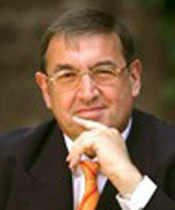 Dr. Karl Lamers is a German politician of the Christian Democratic Union (CDU), currently serving as Deputy Chairman of the Defence Committee of the German Parliament. From 2010 to 2012 he was the President of the NATO Parliamentary Assembly. Specialized in Defence and Security policies, his approach is highly relevant as a European policymaker and an insider of NATO. In addition to his post as president of the Parliamentary assembly of NATO, and since 2008, he is also the honorary president of the Atlantic Treaty Association.
Dr. Karl Lamers is a German politician of the Christian Democratic Union (CDU), currently serving as Deputy Chairman of the Defence Committee of the German Parliament. From 2010 to 2012 he was the President of the NATO Parliamentary Assembly. Specialized in Defence and Security policies, his approach is highly relevant as a European policymaker and an insider of NATO. In addition to his post as president of the Parliamentary assembly of NATO, and since 2008, he is also the honorary president of the Atlantic Treaty Association.
Gen. Jean-Paul Paloméros
Supreme Allied Commander Transformation, NATO Allied Command Transformation
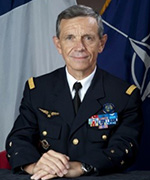 General Jean-Paul Paloméros was confirmed by the North Atlantic Council as supreme allied commander transformation on August 6, 2012 and assumed command in Norfolk, Virginia, on September 28, 2012.
General Jean-Paul Paloméros was confirmed by the North Atlantic Council as supreme allied commander transformation on August 6, 2012 and assumed command in Norfolk, Virginia, on September 28, 2012.
He joined the French Air Force Academy in 1973 and qualified as a fighter pilot in 1976. Throughout his career he acquired extensive experience both as an operational Commander and as a fighter pilot, having flown eighty-two combat missions and more than 3,500 flying hours, mostly on Mirage F1C and Mirage 2000 aircraft.
He commanded 2/12 Picardy Squadron in Cambrai, which he led for the “Epervier” operational deployment in Chad (1987) and then the 30th Fighter Wing in Reims (1990).
He was then appointed as commander of Cazaux Air Force Base from 1996 to 1998. This base hosts one the main French flight test centers, several advanced French flying training squadrons, and a permanently stationed Singaporean training squadron.
General Paloméros also has a diverse background in multinational operations and was deployed in Vicenza, Italy (1993) as deputy commander of the French Air Force during Operation Crecerelle, French participation in Operation Deny Flight, and then in Kiseljak, Bosnia-Herzegovina (1995), where he was in charge of coordinating the air-ground campaign during Operation Deliberate Force.
He became the head of the Studies and Strategic Plans Department of the French Air Force Staff in 1998. Promoted to brigadier general in 2001, he was appointed as chairman of the capability development committee within the French Joint Staff and in August 2002 became the head of the plans and program division.
In April 2005, he was appointed vice-chief of staff of the French Air Force. In this function, he developed and implemented the new organization named Air 2010. Promoted to general, he went on to serve as Air Force chief of staff from 2009 to 2012.
General Paloméros graduated from the Royal Air Force Staff College, Bracknell, Great Britain in 1993, where he was awarded the Curtis Prize by the chief of the Air Staff of Great Britain.
He was awarded the rank of grand officer of the French Legion of Honor in 2009. He is also an officer of the National Order of Merit and holds the Aeronautical Medal.
H.E. Milica Pejanović Đurišić
Minister of Defense, Montenegro
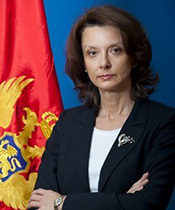 Milica Pejanović Đurišić was appointed minister of defense of Montenegro in March, 2012. She began her career in public service in 1990, when she became a member of the Presidency of the Republic of Montenegro in the first direct elections and stayed in office until the end of 1992. From 1992 to 2001, Pejanović Đurišić served as a member of parliament, which included her tenure as vice president of the Democratic Party of Socialists of Montenegro from 1992 to 1997 and president of the Democratic Party of Socialists of Montenegro from June 1997 to October 1998. Her career in public service also included time as ambassador of the State Union of Serbia and Montenegro from 2004 to 2006 in Brussels and ambassador of Montenegro to France, the Principality of Monaco, and UNESCO from 2007 to 2010. Pejanović Đurišić also has a distinguished career in academia, teaching at the Faculty of Electrical Engineering of the University of Montenegro from 1982 to 1998, and acting as vice dean of Academic Affairs and the President of the Council of the Faculty of Electrical Engineering in Podgorica. Pejanović Đurišić’s work was presented in over 200 scientific papers in international journals and conferences, as well as more than 90 scientific papers in national journals and conferences. She is a member of professional associations of IEEE, IEICE, the Telecommunications Society of Serbia and Montenegro, as well as a member of the Programme Committee of TELFOR, TELSIKS and the Chairperson of the INFOFEST Expert Committee. She also served as the President of the Management Board of Telekom of Montenegro (1999 – 2002), and as the President of the Board of Directors of the first Montenegrin Internet provider. She obtained a Master’s degree and a PhD in Telecommunications in 1987, from the Faculty of Electrical Engineering in Belgrade.
Milica Pejanović Đurišić was appointed minister of defense of Montenegro in March, 2012. She began her career in public service in 1990, when she became a member of the Presidency of the Republic of Montenegro in the first direct elections and stayed in office until the end of 1992. From 1992 to 2001, Pejanović Đurišić served as a member of parliament, which included her tenure as vice president of the Democratic Party of Socialists of Montenegro from 1992 to 1997 and president of the Democratic Party of Socialists of Montenegro from June 1997 to October 1998. Her career in public service also included time as ambassador of the State Union of Serbia and Montenegro from 2004 to 2006 in Brussels and ambassador of Montenegro to France, the Principality of Monaco, and UNESCO from 2007 to 2010. Pejanović Đurišić also has a distinguished career in academia, teaching at the Faculty of Electrical Engineering of the University of Montenegro from 1982 to 1998, and acting as vice dean of Academic Affairs and the President of the Council of the Faculty of Electrical Engineering in Podgorica. Pejanović Đurišić’s work was presented in over 200 scientific papers in international journals and conferences, as well as more than 90 scientific papers in national journals and conferences. She is a member of professional associations of IEEE, IEICE, the Telecommunications Society of Serbia and Montenegro, as well as a member of the Programme Committee of TELFOR, TELSIKS and the Chairperson of the INFOFEST Expert Committee. She also served as the President of the Management Board of Telekom of Montenegro (1999 – 2002), and as the President of the Board of Directors of the first Montenegrin Internet provider. She obtained a Master’s degree and a PhD in Telecommunications in 1987, from the Faculty of Electrical Engineering in Belgrade.
Barry Pavel
Vice President and Director, Brent Scowcroft Center on International Security, Atlantic Council
Barry Pavel is vice president and director of the Brent Scowcroft Center on International Security, focusing on emerging security challenges, defense strategies and capabilities, and key European and global defense issues.
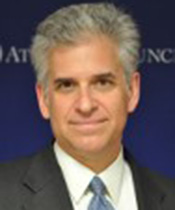 Pavel was a career member of the Senior Executive Service in the Office of the Under Secretary of Defense for Policy for almost eighteen years. From 2008 to 2010, he served as the special assistant to the president and senior director for defense policy and strategy on the National Security Council staff, serving both President George W. Bush and President Barack Obama. In this capacity, Pavel led the development of five of the first eight Obama Administration Presidential Study Directives. He was the initiator and architect of the NSC’s first-ever National Security Priorities Review and a key contributor to the president’s 2010 National Security Strategy; led the NSC’s oversight of the four Defense Department strategic reviews, including the president’s September 2009 decision on European missile defense and all presidential decisions on nuclear policy and posture; co-led the development of the president’s June 2010 National Space Policy; and contributed to the president’s policies on Europe and NATO, Korea, cyberspace, Defense Department operational plans and activities, military family policy, and other matters. Pavel holds an MA in security studies and an MPA in international relations from Princeton University’s Woodrow Wilson School and a BA in applied mathematics and economics from Brown University.
Pavel was a career member of the Senior Executive Service in the Office of the Under Secretary of Defense for Policy for almost eighteen years. From 2008 to 2010, he served as the special assistant to the president and senior director for defense policy and strategy on the National Security Council staff, serving both President George W. Bush and President Barack Obama. In this capacity, Pavel led the development of five of the first eight Obama Administration Presidential Study Directives. He was the initiator and architect of the NSC’s first-ever National Security Priorities Review and a key contributor to the president’s 2010 National Security Strategy; led the NSC’s oversight of the four Defense Department strategic reviews, including the president’s September 2009 decision on European missile defense and all presidential decisions on nuclear policy and posture; co-led the development of the president’s June 2010 National Space Policy; and contributed to the president’s policies on Europe and NATO, Korea, cyberspace, Defense Department operational plans and activities, military family policy, and other matters. Pavel holds an MA in security studies and an MPA in international relations from Princeton University’s Woodrow Wilson School and a BA in applied mathematics and economics from Brown University.
Fabrice Pothier
Head of Policy Planning, Office of the Secretary General, NATO
Fabrice Pothier is the head of policy planning at the NATO headquarters.
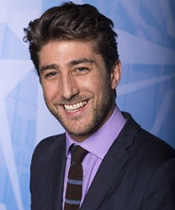 Prior to his NATO appointment, Pothier was founding director of Carnegie Europe, the Carnegie Endowment for International Peace’s pan-European foreign policy centre based in Brussels. Under his leadership, Carnegie Europe became one of Europe’s most active think-tanks on foreign policy and strategic issues by bringing global and regional perspectives, creating a regional research platform with leading senior analysts and engaging with senior European policy makers and commentators through innovative public and private fora. Previously, Pothier was head of policy analysis and cofounder of the International Council on Security and Development (ICOS), which was initiated by the Network of European Foundations. He was international research manager at the London-based strategic consultancy Europe Japan Centre, owned by Japanese energy group Osaka Gas.
Prior to his NATO appointment, Pothier was founding director of Carnegie Europe, the Carnegie Endowment for International Peace’s pan-European foreign policy centre based in Brussels. Under his leadership, Carnegie Europe became one of Europe’s most active think-tanks on foreign policy and strategic issues by bringing global and regional perspectives, creating a regional research platform with leading senior analysts and engaging with senior European policy makers and commentators through innovative public and private fora. Previously, Pothier was head of policy analysis and cofounder of the International Council on Security and Development (ICOS), which was initiated by the Network of European Foundations. He was international research manager at the London-based strategic consultancy Europe Japan Centre, owned by Japanese energy group Osaka Gas.
He holds Masters’ degrees from London Metropolitan University and Université de Versailles.
Anders Fogh Rasmussen
Secretary General, NATO
Anders Fogh Rasmussen has been secretary general of NATO since 2009.
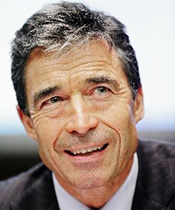 Prior to leading NATO, Rasmussen was prime minister of Denmark from 2001 to 2009. Rasmussen held numerous other positions in government and opposition throughout his political career. From 1987 to 1992, he was minister for taxation and from 1990 to 1992 he was also minister for economic affairs in the Conservative-Liberal coalition government. As minister for economic affairs and member of the EU’s ECOFIN-council 1990-92, Rasmussen was the Danish negotiator of and signatory to the Maastricht Treaty. From 1992 to 1998, he was spokesman for the Liberal Party and from 1993 to 1998 he was also vice chairman of the parliament’s Economic and Political Affairs Committee. In 1998 he became chairman of the Liberal Party’s national organization and vice chairman of the parliament’s Foreign Policy Board. During the Danish presidency of the European Union from July to December 2002, Rasmussen played a key role in the process leading to conclusion of the accession negotiations with ten candidates for EU-membership at the meeting of the European Council in Copenhagen in December 2002.
Prior to leading NATO, Rasmussen was prime minister of Denmark from 2001 to 2009. Rasmussen held numerous other positions in government and opposition throughout his political career. From 1987 to 1992, he was minister for taxation and from 1990 to 1992 he was also minister for economic affairs in the Conservative-Liberal coalition government. As minister for economic affairs and member of the EU’s ECOFIN-council 1990-92, Rasmussen was the Danish negotiator of and signatory to the Maastricht Treaty. From 1992 to 1998, he was spokesman for the Liberal Party and from 1993 to 1998 he was also vice chairman of the parliament’s Economic and Political Affairs Committee. In 1998 he became chairman of the Liberal Party’s national organization and vice chairman of the parliament’s Foreign Policy Board. During the Danish presidency of the European Union from July to December 2002, Rasmussen played a key role in the process leading to conclusion of the accession negotiations with ten candidates for EU-membership at the meeting of the European Council in Copenhagen in December 2002.
Rasmussen earned a Master’s of science in economics from the University of Aarhus in 1978. He has written several books on taxation and government structure. Rasmussen was awarded Knight Grand Cross in the Order of Orange-Nassau in the Netherlands in 2014 and the title of Doctor Honoris Causa from the University of Bucharest in 2013.
H.E. Taavi Rõivas
Prime Minister, Republic of Estonia
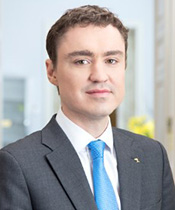 Taavi Rõivas has served as the prime minister of the Republic of Estonia since March 26, 2014. Prior to taking his current role, Rõivas was the Minister of Social Affairs of the Republic of Estonia from 2012 to 2014. From 2011 to 2012, Rõivas served as a member of the 12th Riigikogu, the Chairman of the European Union Affairs Committee, and a member of the Finance Committee. Rõivas was a member of the 11th Riigikogu, a member of the Social Affairs Committee for two years, and then the Chairman of the Finance Committee from 2007 to 2011. Between 2005 and 2007, Rõivas served as the adviser to the prime minister of the Republic of Estonia. Rõivas also served as the Elder of the Haabersti City District Government from 2004 to 2005 before becoming an adviser to the prime minister. He has previously performed the duties of adviser/office manager for the minister of the population affairs of the Republic of Estonia, customer account executive for large corporate companies in the AS IT Grupp, and adviser to the minister of justice. Rõivas graduated from Tallinn Secondary Science School and from the Faculty of Economics and Business Administration of the University of Tartu in international economics and marketing.
Taavi Rõivas has served as the prime minister of the Republic of Estonia since March 26, 2014. Prior to taking his current role, Rõivas was the Minister of Social Affairs of the Republic of Estonia from 2012 to 2014. From 2011 to 2012, Rõivas served as a member of the 12th Riigikogu, the Chairman of the European Union Affairs Committee, and a member of the Finance Committee. Rõivas was a member of the 11th Riigikogu, a member of the Social Affairs Committee for two years, and then the Chairman of the Finance Committee from 2007 to 2011. Between 2005 and 2007, Rõivas served as the adviser to the prime minister of the Republic of Estonia. Rõivas also served as the Elder of the Haabersti City District Government from 2004 to 2005 before becoming an adviser to the prime minister. He has previously performed the duties of adviser/office manager for the minister of the population affairs of the Republic of Estonia, customer account executive for large corporate companies in the AS IT Grupp, and adviser to the minister of justice. Rõivas graduated from Tallinn Secondary Science School and from the Faculty of Economics and Business Administration of the University of Tartu in international economics and marketing.
Ms. Marie Skaare
Special Representative for Women, Peace and Security, NATO
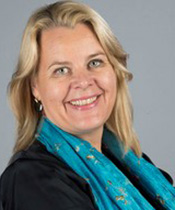 Mari Skåre was appointed the NATO Secretary General’s Special Representative for Women, Peace and Security in August, 2012. Skåre has extensive experience from the Norwegian Foreign Service. Prior to her nomination as Special Representative, she served as Minister Counsellor and Deputy Permanent Representative at the Norwegian Delegation to NATO. She also served as Minister Counsellor and Deputy Head of Mission at the Norwegian Embassy in Kabul and previously as counsellor and legal adviser at the Norwegian Mission to the UN. Skåre joined the Norwegian Ministry of Foreign Affairs in 1991. Her first assignment was as legal adviser in the Secretariat of the Minister of International Development. Since then she has held a number of positions and has extensive knowledge of the UN and NATO. Throughout her career she has worked with issues relating to women and security, particular through her positions as Minister Counsellor at the Norwegian Embassy in Kabul and the Norwegian Delegation to NATO. She has in these positions been instrumental in formulating Norwegian policies and promoting this agenda internationally. Skåre holds a master degree in law from the University of Oslo.
Mari Skåre was appointed the NATO Secretary General’s Special Representative for Women, Peace and Security in August, 2012. Skåre has extensive experience from the Norwegian Foreign Service. Prior to her nomination as Special Representative, she served as Minister Counsellor and Deputy Permanent Representative at the Norwegian Delegation to NATO. She also served as Minister Counsellor and Deputy Head of Mission at the Norwegian Embassy in Kabul and previously as counsellor and legal adviser at the Norwegian Mission to the UN. Skåre joined the Norwegian Ministry of Foreign Affairs in 1991. Her first assignment was as legal adviser in the Secretariat of the Minister of International Development. Since then she has held a number of positions and has extensive knowledge of the UN and NATO. Throughout her career she has worked with issues relating to women and security, particular through her positions as Minister Counsellor at the Norwegian Embassy in Kabul and the Norwegian Delegation to NATO. She has in these positions been instrumental in formulating Norwegian policies and promoting this agenda internationally. Skåre holds a master degree in law from the University of Oslo.
The Hon. Alexander Vershbow
Deputy Secretary General, NATO
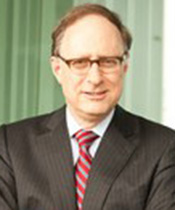 Alexander Vershbow assumed his position in February 2012 after serving for three years as the US assistant secretary of defense for International Security Affairs. From 1977 to 2008, Vershbow was a career member of the United States Foreign Service. He served as US ambassador to NATO (1998-2001); to the Russian Federation (2001-2005); and to the Republic of Korea (2005-2008). He held numerous senior positions in Washington, including special assistant to the president and senior director for European Affairs at the National Security Council (1994-1997) and State Department director for Soviet Union affairs (1988-1991). He received a BA in Russian and East European Studies from Yale University and a Master’s Degree in International Relations and a Certificate of the Russian Institute from Columbia University.
Alexander Vershbow assumed his position in February 2012 after serving for three years as the US assistant secretary of defense for International Security Affairs. From 1977 to 2008, Vershbow was a career member of the United States Foreign Service. He served as US ambassador to NATO (1998-2001); to the Russian Federation (2001-2005); and to the Republic of Korea (2005-2008). He held numerous senior positions in Washington, including special assistant to the president and senior director for European Affairs at the National Security Council (1994-1997) and State Department director for Soviet Union affairs (1988-1991). He received a BA in Russian and East European Studies from Yale University and a Master’s Degree in International Relations and a Certificate of the Russian Institute from Columbia University.
Mr. Damon Wilson
Executive Vice President, Atlantic Council
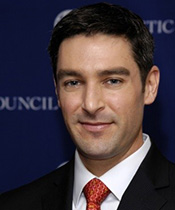 Damon Wilson is executive vice president of the Atlantic Council. His areas of expertise include NATO, transatlantic relations, Central and Eastern Europe, and national security issues. From 2007 to 2009, Wilson served as special assistant to the president and senior director for European affairs at the National Security Council. Previously, Wilson served at the US Embassy in Baghdad, Iraq as the executive secretary and chief of staff. Prior to this posting, he worked at the National Security Council as the director for Central, Eastern, and Northern European affairs from 2004 to 2006. From 2001 to 2004, Wilson served as deputy director of the Private Office of the NATO Secretary General, assisting Lord Robertson in his drive to transform the Alliance by enlarging NATO membership, conducting operations beyond Europe particularly in Afghanistan, and adapting Allied capabilities to face modern threats. Wilson also supported the secretary general’s role in the successful effort to avert civil war in Macedonia. Prior to serving in Brussels, Wilson worked in the US Department of State’s Office of European Security and Political Affairs, on the State Department’s China desk, and at the US Embassy in Beijing. Wilson began his service at the State Department by helping coordinate policy to adapt NATO to modern security challenges and planning for the Alliance’s 50th anniversary summit in Washington during the Kosovo conflict.
Damon Wilson is executive vice president of the Atlantic Council. His areas of expertise include NATO, transatlantic relations, Central and Eastern Europe, and national security issues. From 2007 to 2009, Wilson served as special assistant to the president and senior director for European affairs at the National Security Council. Previously, Wilson served at the US Embassy in Baghdad, Iraq as the executive secretary and chief of staff. Prior to this posting, he worked at the National Security Council as the director for Central, Eastern, and Northern European affairs from 2004 to 2006. From 2001 to 2004, Wilson served as deputy director of the Private Office of the NATO Secretary General, assisting Lord Robertson in his drive to transform the Alliance by enlarging NATO membership, conducting operations beyond Europe particularly in Afghanistan, and adapting Allied capabilities to face modern threats. Wilson also supported the secretary general’s role in the successful effort to avert civil war in Macedonia. Prior to serving in Brussels, Wilson worked in the US Department of State’s Office of European Security and Political Affairs, on the State Department’s China desk, and at the US Embassy in Beijing. Wilson began his service at the State Department by helping coordinate policy to adapt NATO to modern security challenges and planning for the Alliance’s 50th anniversary summit in Washington during the Kosovo conflict.
